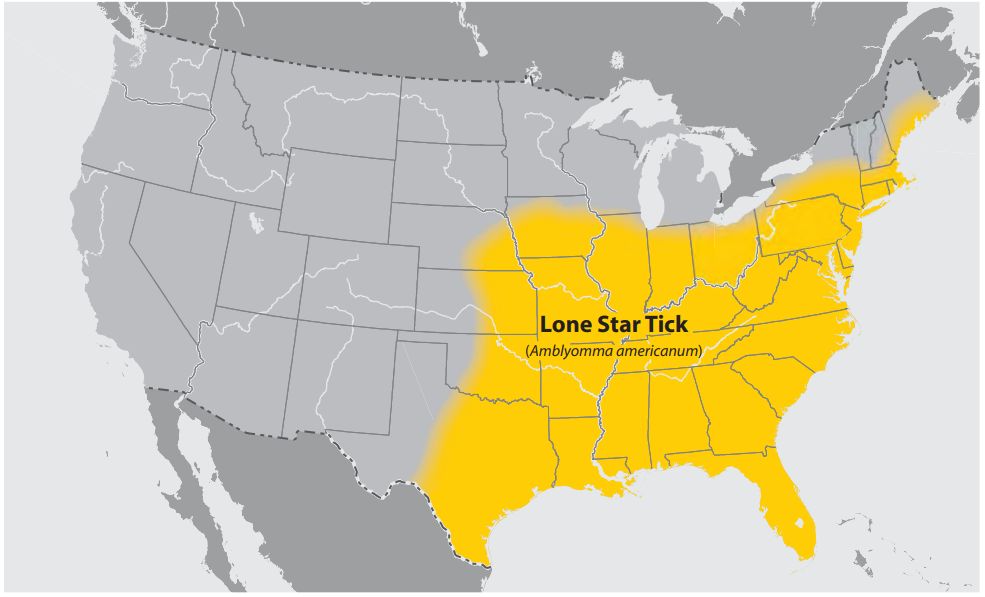LOUISVILLE, Ky. — More Americans are developing a red meat allergy called Alpha-gal syndrome, which comes about after a bite from a Lone Star tick.
The CDC reports 110,229 suspected cases of Alpha-gal syndrome from 2010-2022. That same study predicts up to 450,000 Americans may have been affected by Alpha-gal Syndrome since 2010 and may not know it.
Swan’s journey to diagnosis
For two years, former Louisville TV news anchor Melissa Swan knew she didn’t feel well but had no idea why.
“At the beginning of COVID, I started getting sick to my stomach all the time. I had gastrointestinal pains. Really bad gastrointestinal pains,” said Swan.
She had colonoscopies, endoscopies and more as doctors tried to figure out what was causing her pain.
“I would get a test and it would come back — that wasn’t the problem,” said Swan. “You name it. I had it. Every time it came back negative, it was a relief, but it caused more frustration.”
She may still not have answers if it wasn’t for one night in November 2021.
“I made the most perfect pot roast you’ve ever tasted in your life. I don’t cook a lot, but that day was good, and I ate a lot of it. At 10:30 that night I began to break out in hives, giant hives from my waist to my thighs. I looked like I had a bright red sunburn,” said Swan.
She went to the hospital with anaphylaxis. While there, her blood pressure was recorded at 60/40. Doctors eventually were able to get her stabilized and send her home. However, she left without any answers as to what went wrong.
Later that day, though, she got a call from her doctor referring her to an allergist and warning her not to eat anything she had the day before. She went to the allergist to get a blood test, which is how she eventually found out what the cause was.
“He said ‘it’s called Alpha-gal Syndrome. You’ve been bitten by a lone star tick. You are allergic to everything from a mammal… all red meat.’ I said, ‘I’ve never heard of such a thing,’” said Swan.
Alpha-gal Syndrome is a food allergy that makes people allergic to red meat and other products made from mammals.

It comes about after a bite from a Lone Star tick. The bite transfers a sugar molecule called alpha-gal into the body. This can cause mild to severe allergic reactions to red meat such as beef, pork or lamb. Some people with Alpha-gal Syndrome also get allergic reactions from other foods that come from mammals, such as dairy and gelatin.
How do you know if you have it?
The CDC reports symptoms include:
- Hives or itchy rash
- Nausea or vomiting
- Heartburn or indigestion
- Diarrhea
- Cough, shortness of breath or difficulty breathing
- Drop in blood pressure
- Swelling of the lips, throat, tongue or eye lids
- Dizziness or faintness
- Severe stomach pain
“Most food allergies are immediate meaning when you eat it, the reaction happens within 30 minutes to an hour. With Alpha-gal it’s a little more mysterious,” said Dr. David Pallares with Family Allergy and Asthma. “It will be a delayed reaction, anywhere from four to eight hours after the consumption of the mammalian meat.”

The way to diagnose Alpha-gal Syndrome is through a blood test.
Because of the delayed nature and the symptoms some experience, patients like Swan sometimes seek answers from other medical specialists, not knowing that a food allergy could be to blame.
“It’s so frustrating because many people are like I was getting all kinds of tests. The tests all come back negative. You don’t know what’s wrong with you, but you know there is something wrong with you,” said Swan. “When you get the diagnosis, you just stop eating the meat and that helps a lot.”
Alpha-gal Syndrome is still not commonly understood in the medical community outside of allergy specialists. A CDC study found 78% of health care providers surveyed reported having little to no knowledge of Alpha-gal Syndrome. If doctors are unaware of the syndrome, they may not refer a patient who has symptoms of it to an allergy specialist to get the diagnosis.
What to do if you have it?
Dr. Pallares said patients should avoid mammalian meat like beef and pork. The second level of avoidance would be the byproducts like milk and gelatins.
He adds that patients should have an EpiPen on hand at all times in case there is an accidental ingestion.
Dr. Pallares also encourages people who have it to practice tick prevention measures.
Some patients, like Swan, also need to be careful about cross contamination.
“You must be very careful about cross contamination. You can’t eat anything from a cast iron skillet where there has been red meat or a grill where there has been red meat. When I go out to a restaurant, it can be a tricky situation,” Swan said.
Allergy Insider reports some patients have reported symptoms after inhaling fumes of mammalian meat being cooked.
Swan, who sent us that information, wonders if that could be a reason for her existing symptoms.
People with Alpha-gal Syndrome can still eat chicken, fish, and turkey.
“Once you get a diagnosis, it’s not that difficult to adhere,” said Swan. “You miss bacon. You miss steaks. You miss it all. When you know what you’ve been through, when something nearly kills you, you don’t take a chance.”
Dr. Pallares said if people avoid triggers and prevent tick bites, their symptoms could go away after a few years.
Swan’s message
Swan shared her story with us in hopes it raises awareness so that others may get a diagnosis much quicker than she did.
“If you have unexplained symptoms…. You might be going in for heart checks. You might be going in for gastrointestinal… Something that just isn’t explained, just call an allergist, and get this blood test. It’s simple. And then you’ll know,” said Swan.



